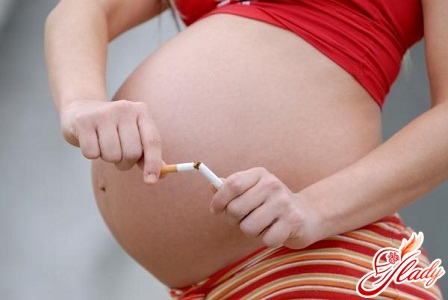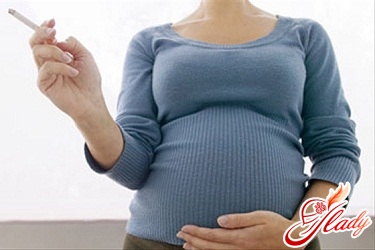 It would seem to be an indisputable fact:smoking is harmful, smoking during pregnancy is doubly harmful. After all, it is not only the woman’s body that suffers. Tobacco smoke also harms her unborn child. Nevertheless, the statistics are as follows: 22% of smokers, even expecting a child, do not give up their habit. At the same time, almost 8.5% of them smoke ten cigarettes a day, and sometimes more. Some of them consider all talk about the harm of smoking for the unborn baby to be empty “horror stories”. Let’s try to figure it out –
It would seem to be an indisputable fact:smoking is harmful, smoking during pregnancy is doubly harmful. After all, it is not only the woman’s body that suffers. Tobacco smoke also harms her unborn child. Nevertheless, the statistics are as follows: 22% of smokers, even expecting a child, do not give up their habit. At the same time, almost 8.5% of them smoke ten cigarettes a day, and sometimes more. Some of them consider all talk about the harm of smoking for the unborn baby to be empty “horror stories”. Let’s try to figure it out –
What harms smoking during pregnancy?
Cigarette smoke contains about four thousand substances harmful to humans. The most well-known of these are
- carbon monoxide
- nicotine - a substance that narrows the blood vessels
- benzene, which has carcinogenic properties
- hydrocyanic acid
- formaldehyde
Carbon monoxide Probably many remember fromschool days, that this substance binds tightly with hemoglobin, forming carboxyhemoglobin - a stable compound that is unable to carry oxygen. Thus, smoking leads to hypoxia (lack of oxygen) in all organs of the smoker, and during pregnancy - also in all organs of the future baby. Doctors once believed that the placental barrier holds any harmful substances, preventing them from entering the baby's blood. However, further studies have shown that - alas! - the placental barrier does not pose a serious obstacle for carbon monoxide. This poison easily penetrates the placenta, binding hemoglobin in the fetus's blood. Moreover, it turned out that the amount of carboxyhemoglobin in the baby's blood can be even 10 - 15% higher than in the mother's blood. And if we also remember that long-term smokers often develop respiratory diseases, which also make it difficult for the body to receive oxygen, we can only sympathize with the poor baby who is literally suffocating in the womb. Nicotine Scientific studies have shown that nicotine can affect the level of some hormones. For example, it reduces the production of progesterone, which is responsible for the successful gestation of pregnancy. In addition, an extremely unfavorable effect of nicotine on the placenta was found. Most women who smoked more than ten cigarettes a day had necrotic areas in the placenta. The placenta of a smoking woman is thinner, its mass is often below normal. Even its shape differs from the shape of the placenta of a non-smoking woman. It is clear that such a placenta copes worse with its functions. Under the influence of nicotine, premature separation of the placenta and extensive infarctions are possible. These phenomena can cause the death of the fetus. Relentless statistics show that such cases occur in women who smoke, regardless of how well they eat. In addition, nicotine causes spasm of the uterine vessels. As a result, the supply of oxygen and nutrients to the baby is difficult.
Other effects of smoking during pregnancy
Some substances that enter the bodywomen when smoking, suppress the immune system. Therefore, smokers often get sick. It is clear that extra illnesses of the mother are not good for the baby. Doctors say that during pregnancy, diseases caused by long-term smoking often worsen. For example, thyroid disease, which occurs six times more often in women who smoke. During pregnancy, problems with the "thyroid gland" increase, some women develop symptoms of Graves' disease - an extremely unpleasant disease, which, by the way, poses a serious threat to the future child (stillbirth, prematurity). Smoking women suffer from severe toxicosis (both early and late) much more often than non-smokers. The likelihood of premature birth or, conversely, post-term pregnancy increases. Women who smoke often have longer labors. The likelihood of complications during childbirth in smokers increases almost twice. It would seem that this is enough for pregnant women to give up their habit for the sake of the health of the child. However, many smokers are in no hurry to give up cigarettes, reassuring themselves with the idea that everything is not so bad.
Myths about smoking

And what does statistics say?
All statistics confirm thatSmoking during pregnancy really does pose a threat to their future children. Miscarriage and premature birth As studies conducted in the USA and Great Britain have shown, the risk of miscarriage in women who smoke is 30-70% higher. The mortality rate during childbirth is 30% higher, the risk of sudden death of the newborn is 52%. According to Czech doctors, in 96% of cases, miscarriage was associated with the mother's smoking. The likelihood of premature birth was directly related to the number of cigarettes smoked by the woman. As it turned out, smoking four cigarettes a day already poses a serious danger to the future child. French researchers observed 9,169 pregnant women in 13 Parisian maternity hospitals and came to similar conclusions: the risk of intrauterine death of the child directly depends on the number of cigarettes smoked by the mother. According to statistics, newborn babies born to smoking mothers have a body weight on average 200-300 grams below normal. Moreover, the children of those mothers who did not smoke during pregnancy, but had this habit before they became pregnant, have a reduced body weight. Even if the mother smokes moderately (that is, smokes less than 9 cigarettes a day), this fact increases the probability of death of her newborn child by 20% and doubles the risk of various developmental anomalies. Heart defects, inguinal hernia, strabismus, cleft palate, harelip - all these disorders are more common in children of smoking mothers. American doctors also claim that smoking increases the likelihood of the birth of a baby with Down syndrome. It has been established that babies whose mothers smoked during pregnancy experience the following consequences of hypoxia (lack of oxygen):
- bad sleep
- irritability, frequent crying
- difficulties with attaching to the chest
In the future, such children often lag behind in both physical and mental development, are less resistant to infectious diseases, and often suffer from bronchitis and lung diseases.
Long-term consequences
According to WHO statistics, the consequences of maternal smokingmanifest themselves in children up to six years of age. Such children begin to read and count later. When taking psychological tests, they show slightly worse results than children of non-smoking mothers. In Great Britain, observations were conducted on 17 thousand children. Scientists carefully examined the babies immediately after birth, then repeated the examination seven and eleven years later. It turned out that children who "smoked" in utero along with their mothers, even at the age of seven and eleven years, showed a slowdown in mental and physical development. Children of mothers who smoked more than ten cigarettes a day were 1 cm shorter (on average) than other children. Such children also lagged behind in mathematics and reading. German doctors also selected 17 thousand children for observation and received similar results. Children of smoking mothers at eleven years old turned out to be weaker than their peers in counting, reading and writing. The results of their psychological tests were also far from the best. The conclusion is clear: pregnant women should not smoke! But how can we overcome this habit?
How to quit smoking?
Sometimes they are found on women's forumsmessages concerning smoking during pregnancy. Often there are disputes – is it possible to get rid of the passion for cigarettes? “You can and you should!” – answer women who once smoked, but gave up this habit during pregnancy or even before it began. “It’s quite difficult!” – object those who are not yet able to part with a cigarette. Both are willing to share secrets with expectant mothers: how to quit smoking or, if this is impossible, reduce the number of cigarettes to a minimum. Here is their advice:
If all your efforts for two weeks do nothave led to the desired results, consider contacting a psychotherapist. Especially if quitting smoking makes you feel anxious. It is advisable to quit smoking at the stage of pregnancy planning, at least a year before the expected conception. And not only for the expectant mother, but also for the expectant father. After all, smoking fathers often experience pathological changes in sperm. It has been established that babies with congenital defects are born to smoking fathers twice as often as to non-smokers. In addition, passive smoking during pregnancy affects the baby no less than the mother's own smoking. So let the toxic smoke not prevent the baby from being born healthy! We recommend reading:









